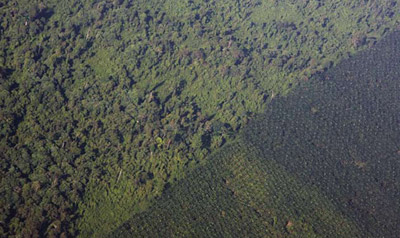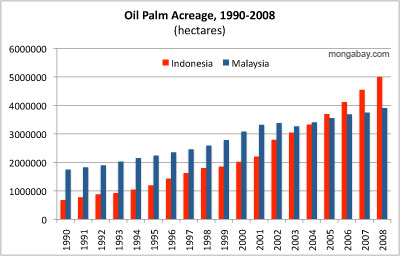U.S. companies should take a leadership role in helping ensure that palm oil production is sustainable and does not come at the cost of forests, climate, and communities, argues a new report published ahead of the annual meeting of the Roundtable on Sustainable Palm Oil (RSPO).
The report, published by the National Wildlife Federation (NWF), says that while the U.S. is only a minor consumer of palm oil, its demand for the vegetable oil is fast rising, increasing four-fold since 2006. Palm oil, which is among the cheapest of vegetables owing to its high yield, is now found in up to 50 percent of packaged retail food products.
 Oil palm plantation and logged natural forest, Sabah, Malaysia. Photo: R. Butler/mongabay.com |
While palm oil is an efficient crop, its cultivation over the past 25 years has come at a high ecological cost in parts of Malaysia and Indonesia. Vast tracts of forest and carbon-dense peatlands have been converted for plantations. Scientists have called the crop the single greatest threat to biodiversity on the planet. Yet palm oil can generate income in regions where jobs are otherwise scarce and is an important source of tax revenue. Can a balance be found?
The NWF report indicates that part of the solution could come via the RSPO, a body set up by industry, environmentalists, and other groups to improve the environmental performance of palm oil. But it cautions that RSPO must become stronger in the areas of governance, verification, forest and peatlands protection, and greenhouse gas accounting to be effective. U.S. companies—and consumers—can help by demanding credible sustainability criteria for palm oil.
“U.S.-based companies and U.S. consumers have a responsibility to influence the inevitable expansion of palm oil in a more sustainable direction, especially as more palm oil enters U.S. markets,” the report states. “While the U.S. is a relatively small importer of palm oil by bulk, a myriad of food products, cosmetics, detergents, soaps and lubricants that contain palm oil find their way into the U.S. market.”
 There are other ways to mitigate the impact of oil palm expansion. A review, published in CAB Reviews, examines some of the options, including setting aside high value conservation areas, land-use advocacy, compensating forest carbon stocks and biodiversity, and enhancing regulation and enforcement. Betsy Yaap et al (2010). Mitigating the biodiversity impacts of oil palm development. CAB Reviews: 5, No. 019. (Photo: Data from FAOstat) |
Interest from American buyers could signal to producers in Indonesia and Malaysia that there is indeed a market for greener palm oil.
The report suggests that further pressure could come from Brazil’s nascent palm oil industry. The South American country has millions of hectares of land suitable for the crop and has made sustainable production a priority for new plantings, which are targeted for abandoned agricultural lands.
The report, authored by Eric Palola and Nathalie Walker, is available at nwf.org/deforestation.
Related articles
Nestle’s palm oil debacle highlights current limitations of certification scheme
(03/26/2010) Last week Nestle, the world’s largest food processor, was caught in a firestorm when it attempted to censor a Greenpeace campaign that targeted its use of palm oil sourced from a supplier accused of environmentally-damaging practices. The incident brought the increasingly raucous debate over palm oil into the spotlight and renewed questions over an industry-backed certification scheme that aims to improve the crop’s environmental performance.
Consumers should help pay the bill for ‘greener’ palm oil

(01/12/2010) Palm oil is one of the world’s most traded and versatile agricultural commodities. It can be used as edible vegetable oil, industrial lubricant, raw material in cosmetic and skincare products and feedstock for biofuel production. Growing global demand for palm oil and the ensuing cropland expansion has been blamed for a wide range of environmental ills, including tropical deforestation, peatland degradation, biodiversity loss and CO2 emissions. In response to these concerns, a group of stakeholders—including activists, investors, producers and retailers—formed the Roundtable on Sustainable Palm Oil (RSPO) to develop a certification scheme for palm oil produced through environmentally- and socially-responsible ways. It is widely anticipated that the creation of a premium market for RSPO-certified sustainable palm oil (CSPO) would incentivize palm oil producers to improve their management practices.














